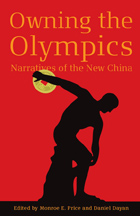
"A major contribution to the study of global events in times of global media. Owning the Olympics tests the possibilities and limits of the concept of 'media events' by analyzing the mega-event of the information age: the Beijing Olympics. . . . A good read from cover to cover."
—Guobin Yang, Associate Professor, Asian/Middle Eastern Cultures & Sociology, Barnard College, Columbia University
From the moment they were announced, the Beijing Games were a major media event and the focus of intense scrutiny and speculation. In contrast to earlier such events, however, the Beijing Games are also unfolding in a newly volatile global media environment that is no longer monopolized by broadcast media. The dramatic expansion of media outlets and the growth of mobile communications technology have changed the nature of media events, making it significantly more difficult to regulate them or control their meaning. This volatility is reflected in the multiple, well-publicized controversies characterizing the run-up to Beijing 2008. According to many Western commentators, the People's Republic of China seized the Olympics as an opportunity to reinvent itself as the "New China"---a global leader in economics, technology, and environmental issues, with an improving human-rights record. But China's maneuverings have also been hotly contested by diverse global voices, including prominent human-rights advocates, all seeking to displace the official story of the Games.
Bringing together a distinguished group of scholars from Chinese studies, human rights, media studies, law, and other fields, Owning the Olympics reveals how multiple entities---including the Chinese Communist Party itself---seek to influence and control the narratives through which the Beijing Games will be understood.
digitalculturebooks is an imprint of the University of Michigan Press and the Scholarly Publishing Office of the University of Michigan Library dedicated to publishing innovative and accessible work exploring new media and their impact on society, culture, and scholarly communication. Visit the website at www.digitalculture.org.

The AIDS epidemic has touched the lives of all Americans. An entire generation has been forced to redefine the way it looks at intimacy. Our very images of ourselves are being altered in the wake of this tragic illness. Yet we are only now beginning to discover the true extent of the change AIDS has wrought on American society. This massive challenge to public health is creating a fault line beneath our institutions, threatening to undermine much that we have taken for granted about the pillars of our culture. Looking out across the landscape of AIDS, we sense a fundamental shift in the way we think about ourselves, about others, and about government.
Shattered Mirrors is a deeply moving meditation on the impact AIDS is having on American consciousness. AIDS has become a moral lesson for our nation, Monroe Price argues, but not the narrow lesson about the dangers of deviancy that certain segments of society have professed. The AIDS epidemic challenges some of our most cherished ideas about individual autonomy, free expression, fairness, and confidence in the future. As this book points out, the ultimate legacy of the AIDS epidemic is far more than its terrible impact on the health of the citizenry.
As the disease grinds on, several traditional barriers between church and state, government and the media, citizen and consumer have begun to erode, while other barriers of class, race, and lifestyle are growing larger. It is too early to say whether these and similar changes will be permanent, but as long as there is uncertainty about how devastating AIDS will prove to be to our society, we will continue to debate its meaning and how we should respond to the threat it poses to all of us. In the long run, Price maintains, AIDS may force us to reexamine the role government should play in shaping our personal lives. More than this, it may well oblige us to redefine what we mean by identity and community in a democracy under siege.
READERS
Browse our collection.
PUBLISHERS
See BiblioVault's publisher services.
STUDENT SERVICES
Files for college accessibility offices.
UChicago Accessibility Resources
home | accessibility | search | about | contact us
BiblioVault ® 2001 - 2024
The University of Chicago Press









